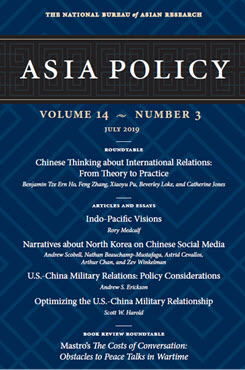China's Rise and U.S. Hegemony
Navigating Great-Power Management in East Asia
This essay examines the implications of China’s rise for U.S. regional hegemony and assesses the extent to which both powers are able to navigate great-power management and orchestrate the building of regional order in East Asia.
Executive Summary
MAIN ARGUMENT
In an increasingly complex regional strategic landscape, both China and the U.S. currently lack the full capacity to take a leading role in orchestrating a central direction for building regional order. Both great powers are facing perception problems and legitimacy issues relating to mistrust, disinterest, and credibility. They, therefore, need to pay greater attention to regional states’ perceptions and preferences and to recalibrate their policies in ways more reflective of evolving regional dynamics. Furthermore, in light of the increasingly competitive nature of U.S.-China relations, effective management of their great-power relationship is important. Unless Beijing and Washington develop and act on their shared interests and responsibilities, a stable regional order will be hard to achieve. Both countries should take measures to not escalate their strategic rivalry and should instead navigate their relationship as selective collaborators anchored in temporality, compartmentalization, and acquiescence.
POLICY IMPLICATIONS
- Both the U.S. and China need to pay greater attention to the manner in which they conduct themselves in the region. The U.S. role remains significant, but regional states are concerned about long-standing U.S. commitments and fear that current policies by the Trump administration could lead to fragmentation. Although China’s influence is rising, its aspirations for centrality do not have full regional endorsement. Predictions of a hegemonic transition from the U.S. to China are thus premature.
- The U.S. should temper its threat-centric rhetoric toward China because overly antagonistic strategies run the risk of creating a self-fulfilling prophecy.
- As U.S.-China competition increases, both countries should navigate their great-power relationship though a strategy of selective collaboration. While understanding their fundamental differences, they should nevertheless recognize avenues for collaboration and cooperation based on their shared interests.
Beverley Loke is a Lecturer in International Relations at the University of Exeter. Her work has been published in the European Journal of International Relations, Pacific Review, Asian Security, Australian Journal of International Affairs, and Diplomacy and Statecraft.
About Asia Policy
Asia Policy is a peer-reviewed scholarly journal presenting policy-relevant academic research on the Asia-Pacific that draws clear and concise conclusions useful to today’s policymakers. Asia Policy is published quarterly in January, April, July, and October and accepts submissions on a rolling basis. Learn more


